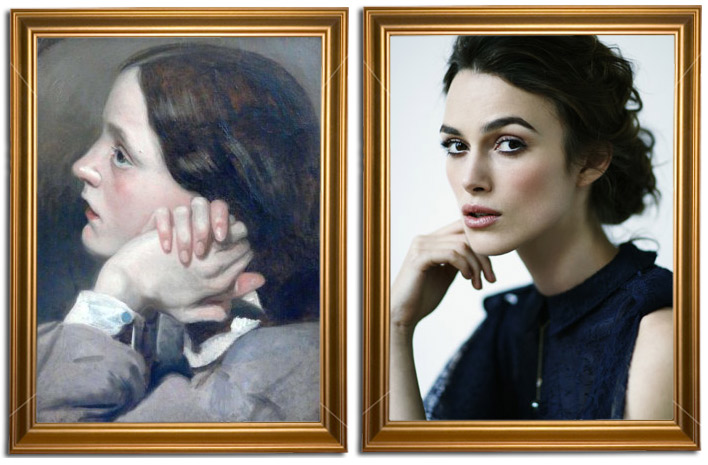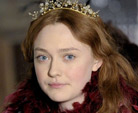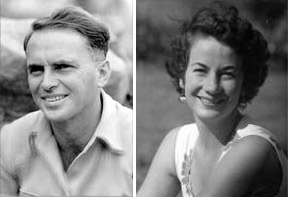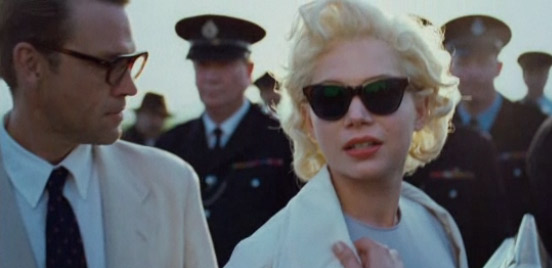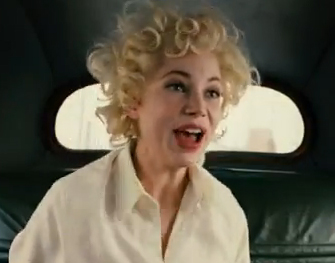Review: "J. Edgar"
 Saturday, November 12, 2011 at 5:00PM
Saturday, November 12, 2011 at 5:00PM 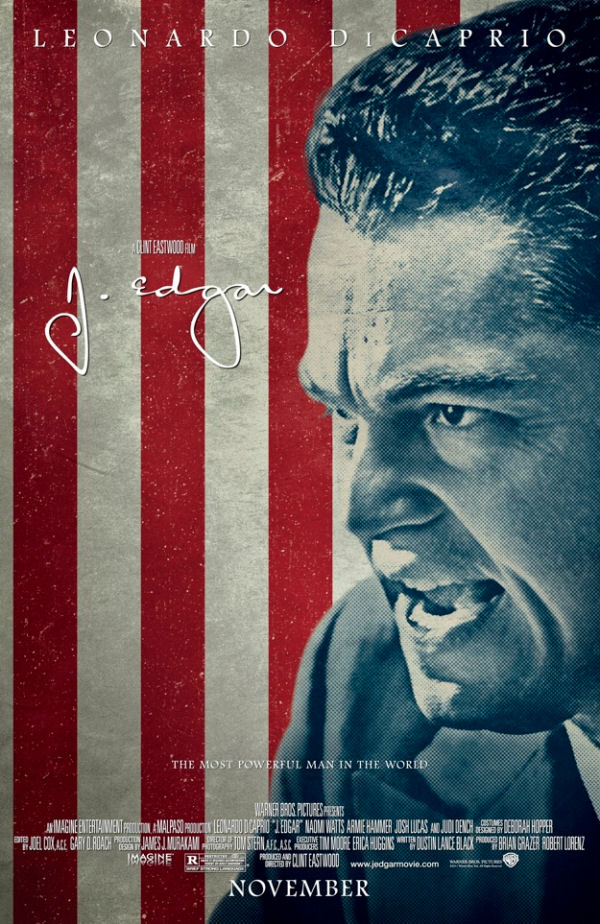 Disclaimer #1: This reviews briefly talks about the ending but... duh. It's history.
Disclaimer #1: This reviews briefly talks about the ending but... duh. It's history.
Disclaimer #2: Everyone has biases and the only people who tend to get in trouble about them are the ones that admit them like me. Generally speaking I think biopics are the dullest of film genres and it takes a strong artistic voice to overcome their persistent nagging limitations. Generally speaking I do not love the work of Clint Eastwood. Though many critics feel duty bound to praise even his most obvious misfires, I've been accused of the exact opposite approach though I liked all four of his modern Best Picture grabs... (just not in the way Oscar did.)
Disclaimer #3: Clint Eastwood makes me sad because -- though this is not his fault -- he has ruined many famous film critics for me. My favorite living filmmaker is Pedro Almodóvar but I didn't try to pretend that Broken Embraces, Live Flesh, or The Skin I Live In were masterpieces. I don't trust anyone who can't see Eastwood's weaknesses as a filmmaker, his inability to vary up his visual ideas, the uneven "we did it in one take!" acting (it shows), and so on...
If you've already tuned out I understand and forgive you. That's too many disclaimers but one must approach the ceaselessly idolized Clint Eastwood with caution. Extreme caution is also recommended when approaching J. Edgar Hoover, the infamous half century FBI overlord and mean SOB. "J. Edgar" who is played from sixteen (?) to death by L. DiCaprio is also, as it turns out, an unreliable narrator. J Edgar (2011) is fully aware of this though weirdly cagey about when to reveal it. Rather than encouraging us to look at the man and his actions with clinical wide eyes from the start, it encourages much sympathy with groaner on-the-button lines like 'no amount of admiration can fill the place where love should be.' In fact, it embraces the title man's point of view to such an extent that he narrates the entire movie -- that old groaner device of "telling his story for posterity." His point of view is the only point of view so even his life long "friend" Clyde Tolson (Armie Hammer) is first viewed only as a menacing shadow behind closed doors, something to be ashamed of. After two plus hours of sympathising and listening to apologies about his behavior (but his mommy hated the gays -- naturally he was fucked up!) he is clumsily retrofitted at the tail end as the movie's Keyser Soze of sorts, only less purely evil on account of all the sad little boy business. But yes, he's been lying all along... or fibbing, if you're still feeling sympathetic.
Though the screenplay needed another few drafts as badly as some of the minor performances needed additional takes, there are brief flashes of the movie it could have been. The Charles Lindbergh and John Dillinger storylines, for example, are enough to fill movies by themselves. We know this because they've made for better movies than J. Edgar. Despite decades of evidence warning filmmakers about this exact "EVERYTHING!" approach, J. Edgar falls for the typical bio-traps. Movies are shorter than novels and definitely shorter than entire human lives and must thus choose which elements are worth dramatizing. Instead J. Edgar, like so many bios before it, crams itself full with cliff notes instead of truly absorbing the text and breathing its ideas. J. Edgar clings to many of the famous storylines and its own suppositions about them as desperately as Hoover clings to Tolson. But it's not just their manly love that's unconsummated; this whole movie has blue balls. Just as you become invested in one chapter or detail, you've lept ahead or backwards and on to another. No one involved in the production ever seems to decided what they found interesting about the material other than "ALL OF IT!"
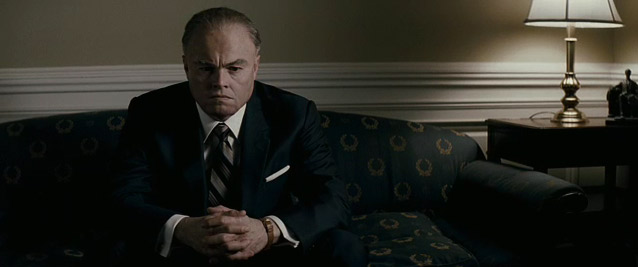
For their part, the actors do what they can with the unfocused material. Leonardo DiCaprio, ever fond of playing anguished men, gives it his all but doesn't reach the charismatic precision or depth of feeling that he can hit when the material is more focused on entertainment than on SERIOUS ACTING. (In short, we're losing DiCaprio the movie star to DiCaprio the 'Master Thespian' and this is a crying shame.) Armie Hammer is more than adept at the dreamy Ivy League gay catch he plays in the early scenes but loses his way once he's playing a character well beyond his own age. He's swathed in lbs and lbs of prosthetics (maybe he couldn't see his marks? Why do makeup artists think "old" means 130? Why does he look older than Judi Dench?) Naomi Watts, who needed anything but yet one more bleak movie on her resume, is barely consequential at all. Though she embodies "Loyalty" -- we know because J Edgar tells us just that in the constant narration -- you could leave her on the cutting room floor and not lose much. Finally, though she's in little of it, Judi Dench walks away with the whole thing with her devastatingly unsympathetic mother-son chitchat about "daffodils". It's obvious and cruel code for "don't be a fairy!" though she knows her boy already is one.
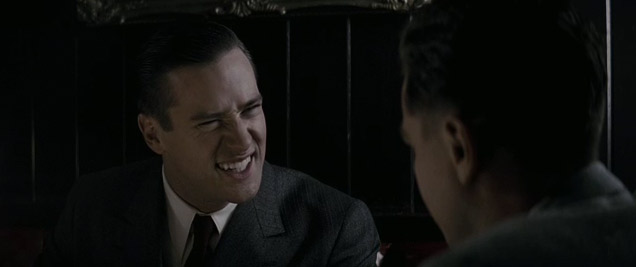 "Is that legal?"In the end, though, what burdens the movie as heavily as the extreme prosthetics must have weighed on Hammer and DiCaprio is its utter joylessness. Again Clint Eastwood dully plinks away on the piano at key moments rather than hiring a composer who could have elevated this movie with something more robust and filled with different shades of feeling. The murky cinematography by Tom Stern, is just as monotonous in feeling in addition to being practically monochromatic. Another Eastwood picture all drained of color. Black and white movies are among the most beautiful movies ever made so if you want to make a black and white movie, have at it; consummate the love affair! But none of this "color is too flowery!" business.
"Is that legal?"In the end, though, what burdens the movie as heavily as the extreme prosthetics must have weighed on Hammer and DiCaprio is its utter joylessness. Again Clint Eastwood dully plinks away on the piano at key moments rather than hiring a composer who could have elevated this movie with something more robust and filled with different shades of feeling. The murky cinematography by Tom Stern, is just as monotonous in feeling in addition to being practically monochromatic. Another Eastwood picture all drained of color. Black and white movies are among the most beautiful movies ever made so if you want to make a black and white movie, have at it; consummate the love affair! But none of this "color is too flowery!" business.
Even the early most playful scenes wherein J. Edgar and Clyde are becoming intertwined lack the spark that you can only see in Armie Hammer's eyes. You could stretch and say that the film's entirely bleak aesthetic is meant to represent the joylessness of Hoover's life only if you've never seen a recent Clint Eastwood. That's just how they always look. The movie is an über-drag, long before J Edgar is softly whimpering in his mamma's dress. D+
 Armie Hammer,
Armie Hammer,  Clint Eastwood,
Clint Eastwood,  Colorology,
Colorology,  J Edgar,
J Edgar,  Judi Dench,
Judi Dench,  LGBT,
LGBT,  Leonardo DiCaprio,
Leonardo DiCaprio,  Naomi Watts,
Naomi Watts,  Reviews,
Reviews,  biopics,
biopics,  politics
politics 


